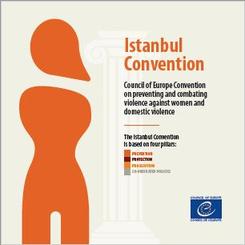
4 minute read
FEMINISM IN HUNGARY
Hungary was never characterized by a strong feminist movement, but some individuals and organisations have brought about strong changes in women ' s rights. In the 19th century Pálné Veres (née Hermin Beniczky) initiated the first feminist movement, establishing higher educational institution for women. She and other supporters of feminism believed that only vanishing ignorance, women could defend their rights. Later women were able to occupy certain job positions.
The improvements of women ’ s status in the society could only continue until Socialism [1]. Even in the recent past, feminism has to face with serious barriers due to several restrictions implemented by the government.
Advertisement
Hungarian parliament stopped the ratification of a regional.
treaty on violence against women, called Istanbul Convention, which was first introduced by Council of Europe in 2011 to prevent violence based on gender.
This can contribute that violence toward Hungarian women might remain unpunished. In particular, women from Roma community may suffer significantly, since their rights have been violating a greater extent [3]. Another shot against gender equity was the ban of gender studies at educational institutions, depriving accreditation for gender studies Master’s and PhD programs.

In response, the European Parliament decided to censure Prime Minister’s politics for oppressing Hungary's democratic institutions, including the media and the academic community [4]. Despite strong governmental constraints, Hungarian feminist movements are reflected the activities of particular organizations as well as individuals, who continue contributing for gender equality and women rights in Hungary.
Judit Acsady was among the first feminists who started feminist movements in Hungary after the political system changed in 1989. She conducted a number of lectures on women and society, which later grew into The Feminist Network. The Feminist Network activists organized the first hotline for women who were victims of violence, which exists nowadays and provides professional services. According to Acsady, there are quite many issues that Hungarian women still face, in particular, representation of females at state bodies is considerably low.
However, Acsady observes some development on a local level, pointing that there are an increasing number of female mayors and female candidates who are successful in local elections. "Some claim that these perspectives are not particularly powerful. But being mayor of a small, remote village with numerous social and economic issues is a position of responsibility [5].
Another important Hungarian researcher and feminist activist, Dorottya Redai fights for gender equity through valuable scientific as well as fiction works. Her research area covers the problems of gender equality in education, childhood politics, anti-gender movements, LGBTQI+ rights. Under her coordination, collection of traditional fairy tales, which incorporates LGBTQI+ characters, "Fairyland is for Everyone" (Meseország mindenkié) was published by Labrisz Lesbian Association in 2020. The book met sharp criticism from Hungarian authorities due to opposing points to oppression, discrimination, and governmental policies [6].
Rita Antoni, also the leader of the feminist movements, doctoral candidate at University of Szeged founded Hungarian feminist group Nőkért Egyesület (Association for Women) in 2012. She conducts researches in the areas of women ’ s and LGBTQI+ rights, the history of feminism, feminist philosophy, domestic violence, violence against women, gender stereotypes.
Rita Antoni managed to translate and review various literature on gender equity and women rights, which were difficult to access for Hungarian women.
There are also activists from youth community who are enthusiastic about spreading the idea of feminism to female communities. Recently, two Hungarian girls, Lili Rutai and Hanna Solti organized a platform Vénusz Projekt with the podcasts, which run once in every two weeks, and rise social as well as gender problems, and analyze social environment, culture and human rights from feminist perspective. Since they started the podcast, their knowledge of feminism has also significantly expanded and they could learn more about how other people view and experience feminism and femininity. Feminism's view varies not only from person to person but also from environment to environment. Their main aim is to make feminism more accessible to all women.

Despite the lack of governmental support, and even oppositions, several organisations have been able to operate in Hungary, aimed at protecting gender equality and women rights. Such organisations are Hungarian Women's Lobby (Magyar Női Érdekérvényesítő Szövetség), NANE (Nők a Nőkért Együtt az Erőszak Ellen Egyesület), Patent can be listed among them.
One of the first feminist advocacy organizations in Hungary called MONA (Mona Magyarországi Női Alapítvány). The foundation works to advance a variety of gender equality issues through lobbying, research, and capacity building. Their recent initiatives have focused on men. The objective of MONA is to inspire public discussion about the diversity of roles and equal rights that exist for men and women in democratic societies while simultaneously exposing e unjust inequities that still exist for women ' s status in the political, social, and economic arenas.
The objectives are to advance gender equality, encourage communication between governmental organizations and civil society on the subject of equal chances for women, and persuade society—and through it, governmental organizations—to increase equal opportunities for women (including through gender mainstreaming) [7].
In order to deal with the violence against women and children, the Women for Women Together Against Violence Association (NANE) was founded in 1994. It is a nonprofit, nongovernmental organization that works to improve lives on an individual, a social, and a community level. The Association's staff and volunteers run the emergency phone lines, which are mostly used to rovide one-on-one help https://dailynewshungary com/feminism-in-the-history-of-hungary/ https://hungarytoday hu/hungary-istanbul-convention-parliament-declaration/ https://docslib.org/doc/12544423/hungary-domestic-violence-including-in-romacommunities https://edition cnn com/2018/10/19/europe/hungary-bans-gender-study-at-collegestrnd/index html https://fpif.org/flowering-feminism-hungary/ https://time com/collection/100-most-influential-people-2021/6095809/dorottya-redai/ https://eige europa eu/men-and-gender-equality/methods-and-tools/hungary/activitymona-magyarorszagi-noi-alapitvany-mona-foundation-women-hungary https://nane.hu/egyesuletunk/ https://institute-genderequality.org/frames-on-gender/countries/hungary/the-hungarianwomens-lobby/
Since its foundation, a helpline dedicated to adult and child victims of domestic violence and abuse has been in operating. They received support from the EU (particularly from International Organization for Migration (IOM) program) and afterwards from the US Embassy [8].
For this, it is important that international conventions are respected in Hungary as well, and that EU standards are adopted at home. In its daily practice, the association strives to ensure that women can enjoy their human rights in all spheres of public life, both in the private and in the public sphere, from legislation to the implementation of laws [9].
Another feminist support is the Hungarian Women’s Lobby, established in 2003, in Budapest. HWL promotes the idea that women and men are equal. In order to support women they developed policy recommendations, organized the Women's Congress. The association tries to improve the social status, life chances and quality of life of women at its own expense and advocates for the prohibition of all forms of discrimination and violence against women.
Despite the fact that the situation in Hungary is not ideal for feminism to flourish, the feminist and radical traditionalist women ' s organizations and initiations stay resilient in Hungary and they are not satisfied with the government-friendly framing of the traditional, dialogical, and gendersensitive approaches to women ' s issues and they are increasingly aware tha he women ' s issue is the question of power relations.
These organisations support each other, networking and deliver common activities to keep alive the values of feminism and deliver meaningful services and activities in order to improve gender equality.


